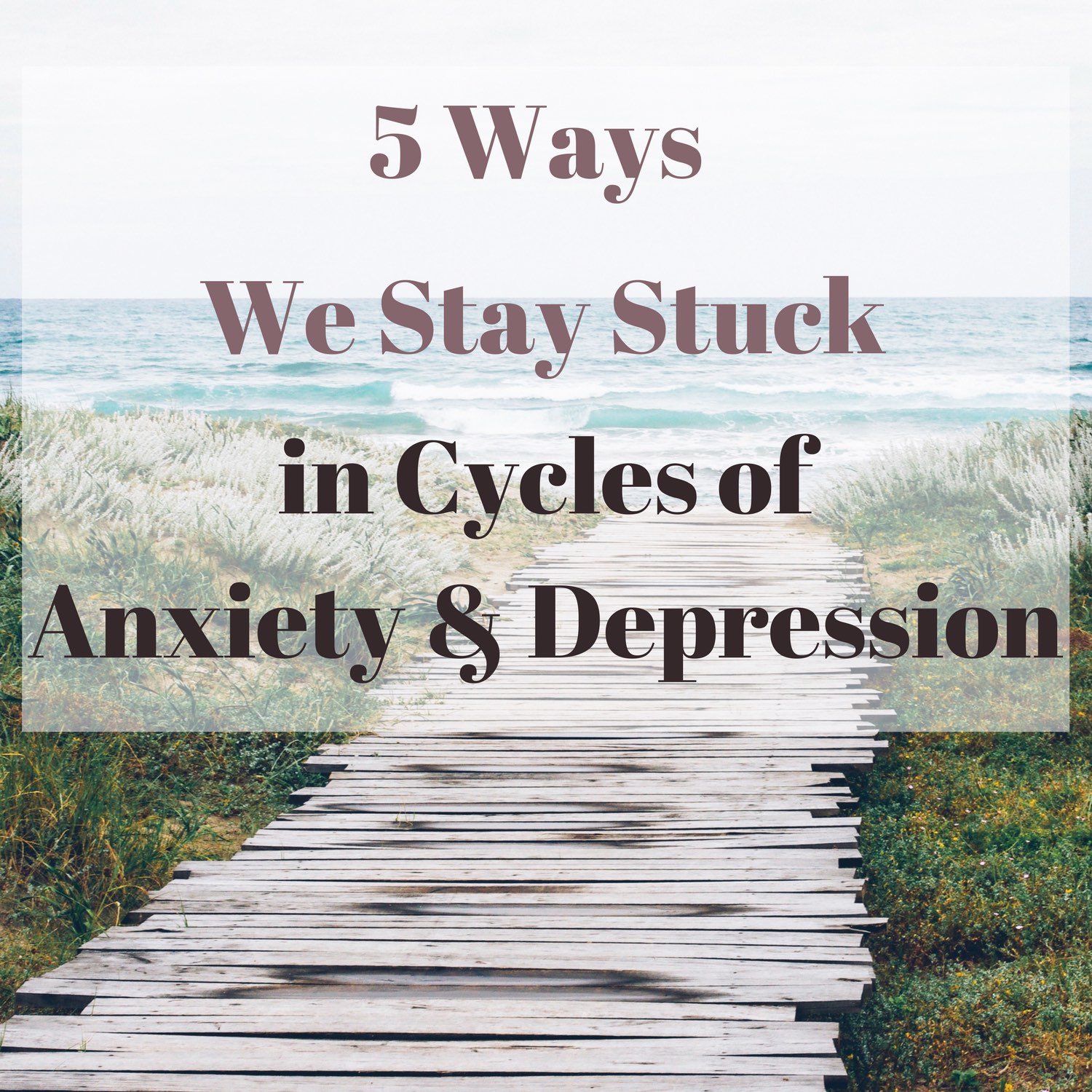5 Ways We Stay Stuck in Cycles of Anxiety and Depression
/Some experiences of anxious or depressed feelings are normal. You notice the feeling but have a sense of being in control of it; it doesn’t interfere with your ability to take action, handle your responsibilities, or participate in activities you enjoy--at least not for long. You might even see the sadness or nervousness as a natural part of the circumstances, of healing, moving forward, or being challenged. You cry it out or give yourself a pep talk and then find yourself moving on.
But sometimes anxiety and depression can become more significant, either in intensity, frequency, or duration.
Both can leave you feeling stuck and uncertain about the way out. Sometimes it’s hard to know where the dip or hurdle began or why it seems to be sticking around.
Most people struggling with feelings associated with depression and anxiety want to understand why it is occurring and want to gain some control over these feelings rather than feeling controlled by them.
Below are 5 areas that could be keeping you stuck in a cycle of depression or anxiety. Often depression and anxiety are complex. Solving one issue doesn’t always solve the whole problem. But if you identify with one or more of these, you may be able to start unraveling the tangles.
Procrastination
Procrastination can really make you feel heavy. It’s like carrying a bag on your shoulder and never taking it off or unpacking it to lighten your load. You know you have to do something, whether it’s complete a project, make a decision, or confront someone. You know that completing the task will offer some relief but something is holding you back. Perhaps addressing the matter makes you uncomfortable or maybe you’re afraid of not doing a good job.
If this is you, ask yourself
What is standing in the way?
Is there an additional problem to be solved or do I need more information?
What action do I need to take today?
Sometimes we have really good reasons to procrastinate, but being aware of and conscious about what you are doing is valuable for ultimately moving forward.
Avoidance
Avoidance is similar to procrastination except that with procrastination there is something you know you need to do, but you perpetually put it off for later. You can avoid without procrastinating because you may not have any intention of facing the issue.
Avoidance is when you go out of your way to evade something uncomfortable. Maybe you’re avoiding someone you feel intimidated by, someone who has hurt you, something that scares you, or the possibility that you might fail or won't live up to others’ expectations.
Addressing avoidance begins with acknowledging what you are avoiding. It can be really helpful to face the circumstance you're avoiding in your mind. Ask yourself about the worst case scenario and how you might survive it.
You can also avoid thoughts. For instance, you might worry that someone doesn’t like you, so you try to think of ways to get them to like you or reassure yourself rather than truly accepting the possibility that they might not like you.
If it's thoughts you are avoiding, you can ask yourself
What if this were true?
What would it mean?
How might I cope with that?
Exploring the thought doesn't make it true, it just helps you to face the thought and make some peace with it if it is true.
It’s easy to spend a lot of time avoiding uncomfortable feelings, but uncomfortable feelings are a normal human experience. Learning to tolerate those feelings and understand what they are trying to communicate is a valuable life tool.
Thoughts and Beliefs
There are a lot of messages in our society to “think positive,” but sometimes the issues we worry about are realistic. Bad things do happen.
“I’M A FAILURE”
”I’M UNLOVABLE”
But often there are beliefs and thoughts present in anxiety and depression that aren’t exactly accurate. Thoughts like, “I’m a failure,” or “I’m unlovable.” These thoughts and beliefs can make us miserable despite often having some evidence to the contrary. Anxiety and depression can also lead you to falsely predict negative outcomes for situations that are truly unpredictable—and even cause you to self-sabotage in order to make the prediction come true.
Surprisingly, despite causing pain, we can be really committed to these beliefs and thoughts. They are often a way we try to protect ourselves from being vulnerable to what we think might be greater pain.
Take a moment and reflect on the thoughts that lead to your negative beliefs. Ask yourself if you can really say that each of these thoughts are factually true. Are there any exceptions that prove your belief/thought wrong? Are there realistic possible outcomes besides the negative one you are presuming?
If you find that something really has some evidence to support your concerns, then you can ask,
What can I do about this?
What are some ways I can get through this if my fear is true?
Is there something I can change or improve?
Is there someone who I can talk with about how I’m feeling?
Fear of Conflict
Ugh! That feeling in the pit of your stomach when you know you need to address something with someone but you are sure the outcome is not going to be good (which, by the way, may not be an accurate belief).
So you keep stuffing it.
You don’t say how you really feel and you don’t ask for what you need. Leaving things unsettled and accepting less than what we deserve can create a heavy emotional burden. It can also lead us to stay in all kinds of relationships that aren’t great for us. Learning some skills for addressing conflict can make a big difference. Garnering up support and a pep talk from a friend or family member before addressing the conflict can also be helpful. In addition, it also takes some self-esteem and self-compassion—believing that your thoughts, feelings, and needs deserve to be voiced and heard.
Conflict is uncomfortable, so being willing to accept and tolerate the discomfort can be helpful.
If you fear for your safety when it comes to conflict, pay attention to that signal and don’t move forward without talking it over with a professional who has experience with relationships that can feel threatening at times.
Fear of Loss
This is a big one. It’s really easy to get stuck in a depressive or anxious pattern because we are afraid of facing a loss.
Fear of loss can be paralyzing.
You might be afraid of losing the admiration or affection of someone. You might fear someone finding out you aren’t perfect after all and rejecting you. You might fear facing the loss of a dream or losing your health. Identifying what you are really afraid of is really important.
Acknowledging sadness about the loss or potential loss is important, while also identifying how you will get back on your feet despite it being tough.
Fear of loss calls for a lot of self-compassion. It also calls for you to give yourself some credit. Most people are more resilient than they think. If you are reading this, that shows you have some resourcefulness in you. Embrace that belief in yourself.
Be Kind to Yourself
You might notice that all 5 of these have a thread of avoidance running through them. Sometimes we avoid things because we need extra support, new skills, or we just have too much on our plate.
Try not to judge yourself.
Avoidance just describes a behavior. It can be an effective coping tool for a period of time. But at some point it usually needs to be addressed. I hope that this post helped you identify some areas where you can get brave and take some action.
If you just can't get going or feel overwhelmed by the challenges you need to solve, you don’t have to do it all alone. Even if you are not widely connected, there are places to go for support, whether it be a church, community group, or online support group.
If you'd like to talk with someone in a safe, confidential, and therapeutic space, I am here for you. Individual and group therapy are a great resource for navigating anxiety and depression.
Most importantly, know that you are not alone. Life is challenging to navigate. But keep going! Be brave!
Melissa
Get Updates about New Blog Posts
If you find these posts helpful, sign-up to receive notices about new blog posts.
About Melissa King
I am a licensed mental health counselor in New York City with a psychotherapy office in the neighborhood of Murray Hill in Manhattan. Find out more about me here. I'd love to hear from you. Email me if there's a topic you'd like to read about here.



